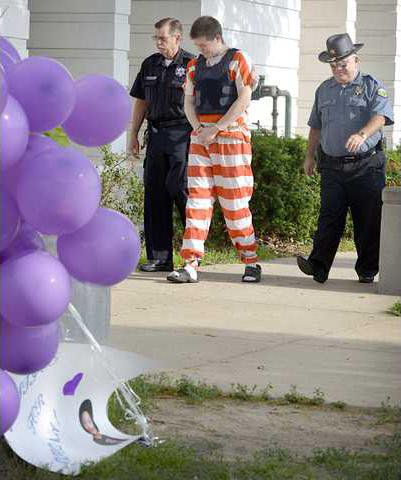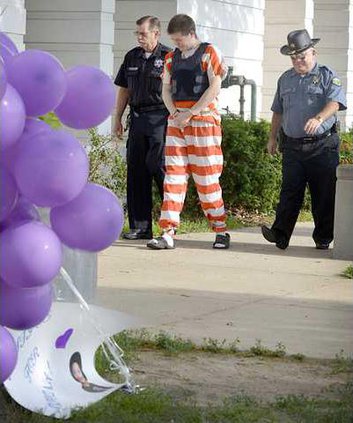After four hours of preliminary hearing testimony in Barton County District Court Tuesday, 20th Judicial Magistrate Judge Richard E. Burgess Jr. ruled Chaz Stephens, Hoisington, will stand trial for the March 18 death of 2-year-old Hoisington girl Iviona MaRae May Lewis.
In addition to the murder charge, he faces charges of child abuse, possessing methamphetamine, drugs and drug paraphernalia with the intent to use.
Following the testimony from the parents of the girl, Stephens’ parents, and two good Samaritans from Hoisington, the defense attorney Paul R. Oller announced Stephens waived his right to hear all evidence against him and allowed himself to be bound over for arraignment in August.
The 25-year-old man had his first court appearance on March 23 and the April 5 preliminary hearing was scheduled at that time. However, it was noted that due to the complexity of the case and the need to secure a court-appointed attorney for Stephens the hearing would probably need to be moved to a later date to allow both the prosecution and the defense time to prepare for the case.
So, two days for the hearing was to take place, it was continued to this week.
The toddler was reported missing on the afternoon of March 20, and was later found dead in rural Barton County. Stephens, who was an acquaintance of the child, was arrested early the next morning and booked into the Barton County Jail where he remains in custody.
District Judge Scott McPherson will preside over Stephens’ arraignment which is scheduled for 1 p.m. on Thursday, Aug. 23.
Young family was struggling, but kids described as happy
Prosecuting attorney Lindzie Carter, on staff with the Kansas Attorney General’s office, brought her first witness, Iviona’s mother.
Annissia Rose Janice Houp was the girlfriend of defendant Chaz Stephens.
They had been together for nearly a year at the time of Iviona’s disappearance.
The two lived together at 414 North Elm Street in Hoisington, in a house owned by Stephens’ parents, Tigie and Shannon Stephens. With them resided Annissia’s two children, Iviona, nearly three years old, her brother Ja’Mari Alexander Lewis, one year, and the couple’s three-month-old son Killian Joseph Stephens.
Both were unemployed, Houp said, so the relationship was stressed, and it was not unusual for Stephens to be gone, leaving Houp to care for the three children on her own.
Houp wanted more help with the children, especially with the baby, Killian, and this led to many verbal fights. Still, she noted that Stephens had from time to time hoped to play a larger role in the lives of her older children, who continued to have a close relationship with their father, Davonte Lewis, Great Bend, who would have them on weekends whenever he could.
Through Houp’s testimony and that of witnesses Jennifer Behrle and Richard Rhodes, Chaz Stephens’ parents Shannon and Tigie Stephens, and Lewis, a timeline emerged of the events surrounding the child’s death.
Last days
According to Houp, the last time she saw her daughter, she watched her playing inside the children’s bedroom with brother Ja’Mari at their home. It was a Sunday evening, on March 18, 2018. She was standing outside her house, smoking a cigarette after an argument with Stephens, keeping an eye on them through the bedroom window. When she was done, she attempted to reenter the home, only to find she had been locked out, and Stephens did not let her in.
Three days earlier, on Friday, March 16, all five family members agreed to house sit for Stephens’ friend, Charlie Demel. Houp recalled on Saturday, March 17, Stephens had gone to Great Bend in the afternoon, and had not returned by evening. She put the kids to bed, and then experienced a seizure, hit her head, bit her lip, and didn’t wake up until the morning.
When she woke on Sunday morning, she was still experiencing headaches and nausea. Stephens had not returned, and her phone was not working to call for help. She dressed the kids and began walking in the rain to the library where she could access wi-fi or a phone so she could find someone to take care of her kids and drive her to the hospital to have her injuries looked at.
That’s when Jennifer Behrle and her husband Richard Rhodes spotted her struggling to walk with her children, and asked if they could help. They let her children play with theirs while she managed to get in touch with Stephens who arrived shortly after to pick her and the kids up and take them home.
Several times throughout the testimony, it was noted that Iviona had been an active and happy child who reacted to discipline with temper tantrums from time to time, but not anything out of the ordinary.
After they returned home and the kids were taken care of, the verbal argument began. When Houp was unable to reenter the house, she walked back to Behrle’s home to ask for a ride to the hospital in Great Bend, but Behrle was at work. Rhodes offered to take her instead.
On the way, she reached a friend using Rhodes’ phone, and asked Rhodes to drop her at her brother’s house in Great Bend so the friend could take her to the emergency room. It was determined later that night her injuries were not serious and she was released. She returned to her brother’s house, where Iviona’s father Davonte also lived, and she made several attempts to reach Stephens.
Houp also attempted to reach Stephens parents, but had no luck all day Monday. It wasn’t until Tuesday that Stephens finally answered her call, and agreed to come and get Houp. He arrived that afternoon with only Ja’Mari and Killian. He said he thought she had taken Iviona with her, and that’s when Houp began to realize something was wrong.
At first, Houp thought her daughter was simply missing. Stephens’ statements about the last time he’d seen the child were inconsistent.
She called his mother, Shannon Stephens, and asked if she had Iviona or had seen her, and told her the child was missing. Shannon and husband Tigie met their son and Houp at the couple’s house, and began an in-depth search of the property.
Tigie contacted Hoisington Police Captain Josh Nickerson to report the child missing, and a community-wide search began.
After Houp had left with Stephens, Davonte had left for Salina, but when he received word his daughter was missing, he went directly to Hoisington to assist with the search.
Coroner testifies
Following witness testimony and a one-hour recess for lunch, forensic pathologist Dr. Charles Glenn provided his testimony. He received the white body bag containing Iviona Lewis’ remains inside a black plastic garbage sack on Wednesday, March 21, after she was discovered by law enforcement in rural Barton County.
It was his initial finding that she had no serious health issues, but had sustained overwhelming injuries to her face, scalp and thighs. He determined blunt force injury to the head was the cause of death.
It was apparent the toddler had sustained multiple injuries to her head, face and shoulders, and her thighs were covered with multiple abrasions and contusions. There was evidence of subdural hematoma, or damage to the dura membrane surrounding the brain, which Glenn determined may have occurred between 12 and 24 hours before the child died.
The autopsy of the brain also revealed both extemic and hypoxic changes to the brain caused when the brain was cut off from oxygen. This could indicate swelling from impacts cutting off the flow of blood, or the inability to breath, Glenn said.
The coroner also ran a toxicology screening, and found that the blood in her aorta contained ibuprofen, and anti-inflammatory that may have been administered if she had been exhibiting common symptoms associated with trauma like lethargy. Her urine also contained methamphetamine, indicating she had been exposed to the drug. However, she did not have meth in her blood.
“She had a lot of urine for a three-year-old,” Glenn said. About 110 milliliters. This could indicate she had been unconscious for a period. The average child Iviona’s age would normally contain 25 to 50 milliliters of urine in her bladder. This, however, was not a specific finding he added.
Probable cause hearing waived, arraignment set
Following Glenn’s testimony, the defense requested and was granted a five-minute recess. Oller and Carter conversed during the recess, and upon return to the hearing, the Oller announced Stephens had agreed to waive his right to continue the hearing to determine probable cause and agreed to be bound over for arraignment. Judge Burgess confirmed Stephens was aware he was giving up this right, and then made his determination.
Following the evidence provided, he found a crime had been committed, and Stephens will face five felony counts: first degree murder, abuse of a child, possession of a controlled substance, and two counts of interfering with law enforcement. It was noted at the beginning of the trial that if the findings determined the case would go to trial, the state intends to also bring additional misdemeanor charges.





